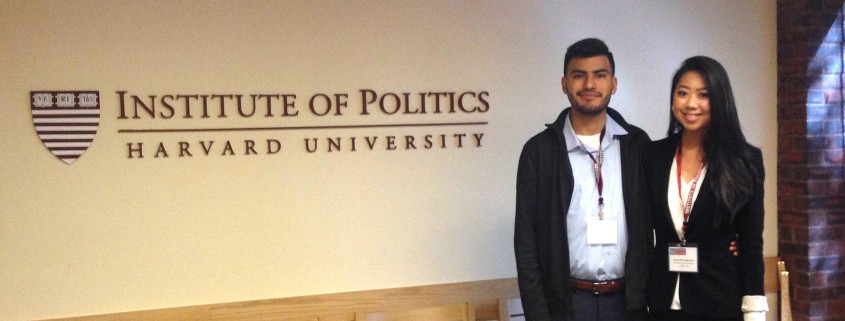Students attend political engagement conference
Students Sarah Dhanaphatana and David Moreno returned to campus late Sunday night after representing USC at a Harvard Institute of Politics conference “Campus Activation: Increasing Student Voting and Political Engagement” over the weekend.
Undergraduates from across the country traveled to Harvard University to participate in the conference, which featured lectures from political practitioners, expert organizers and noteworthy journalists on voter registration and campus political engagement. The lectures focused on ways to encourage millennials to vote through techniques such as technology.
“We definitely focused in on communication strategies with new technologies and ways to really connect with young voters,” said Dhanaphatana, a junior majoring in political science and deputy features editor of the Daily Trojan. “We didn’t focus on one particular candidate that might have been doing well, [but] rather which candidate created a sense of authenticity when they were using social media.”
One or two representatives each from 27 colleges and universities attended the Harvard conference. Participating schools are members of the Institute of Politics’ “National Campaign for Political and Civic Engagement,” a group colleges and universities that aims to encourage young people to get involved in politics and public service.
Only 22 percent of people ages 18-29, voted in the 2014-midterm elections, which was 13 percent of the total votes casted, according to CIRCLE news, which monitors the trends in young voters.
Moreno, a senior majoring in political science, said one of the more engaging workshops was a discussion and Q&A session with Congressman Joe Kennedy III (D-MA) and Congresswoman Elise Stefanik (R-NY) called “The Importance of Engaging Millennials in the 2016 Election.”
“An interesting thing that we touched on, in terms of the challenges that our generation face, is that a lot of politicians see us more as [people] who can vote for them and get them elected, versus individuals who can actually add to the discussion and contribute to making changes,” Moreno said.
Lecturers such as John Della Volpe, director of polling at the IOP, shared his expertise with students on initiatives to improve voter turnout in young communities. He is a leading authority on global trends, opinions and influences, and contributes regularly to news outlets such as the Huffington Post, The Atlantic and the Wall Street Journal.
“[Volpe] reversed the roles and wanted to hear from us and what our generation was like,” Moreno said. “That was really intriguing in that it showed that even though we all vary on a lot of things on the political spectrum, there were a lot of issues we all felt deeply passionate about, such as college affordability, K-12 education, healthcare and race relations.”
USC’s effort to increase college voting was evident on Sept. 22, when students gathered in front of Tommy Trojan for National Voter Registration Day, a nationwide event that aims to promote greater participation in elections. 549 students registered to vote at the event, nearly double the amount that registered last year. Student representatives at the Harvard IOP Conference over the weekend compared and contrasted voter registration events on their own campuses to try and better student involvement.
“It was intriguing getting to learn about some of the other national voter registration organizations and the methods they utilize for reaching out to students,” Moreno said. “Learning what our peers at other colleges do in regards to campus events and participation was insightful, and will definitely help [our] planning for the 2016 election and beyond.”
USC received an award for its participation in National Voter Registration Day from the Los Angeles County Board of Supervisors, but Dhanaphatana said that the USC student community should not stop there.
“The thing that I am most concerned about at USC, given the fact that we have had things like a good turnout at National Voter Registration day, is keeping the momentum up because we really need to get students out there realizing how impactful their voices are,” Dhanaphatana said. “Legislators are voting on such impactful issues that are directly affecting us, so it is important we all be educated in them.”
Dhanaphatana noted the diversity of schools that were represented at the event.
“We all come from different backgrounds. We are split between party lines, but there is always something a group of college students can agree on and I think that’s what’s so empowering,” she said.

